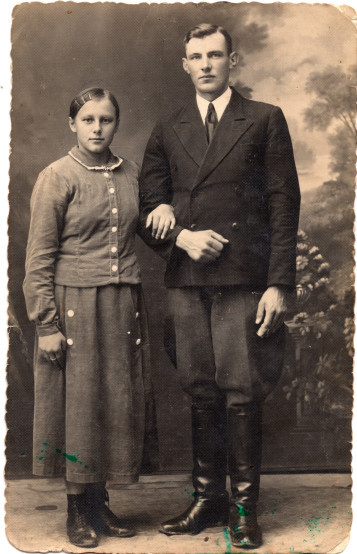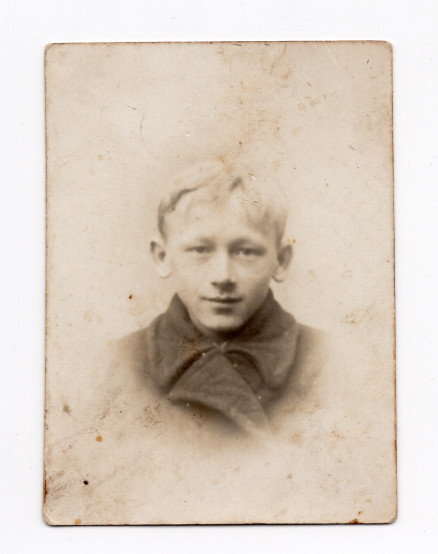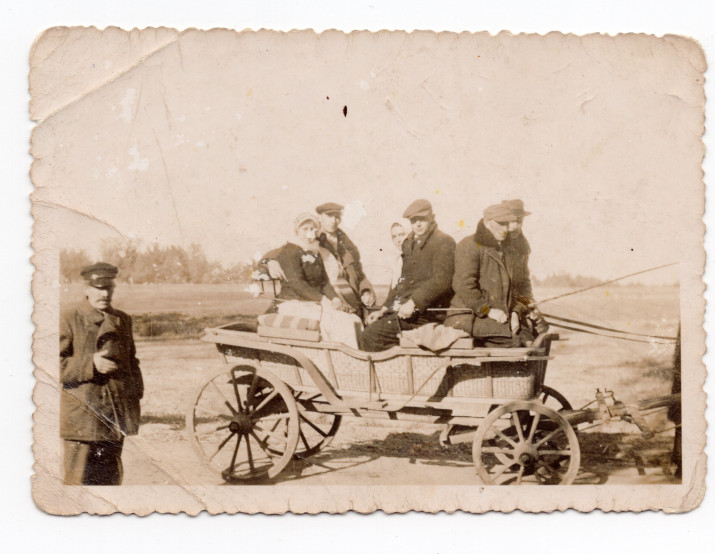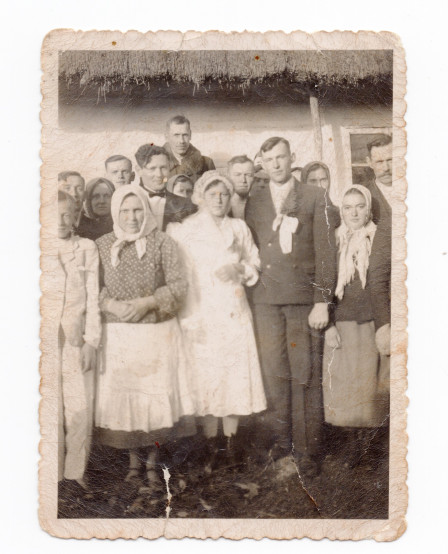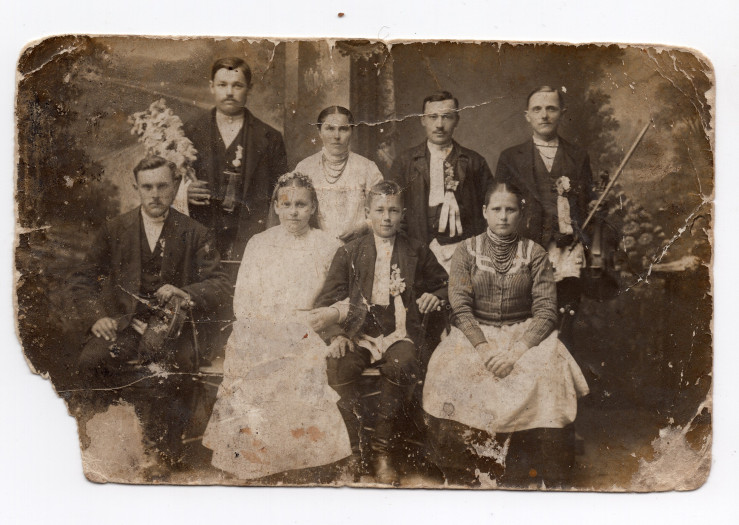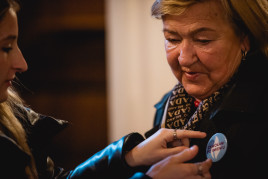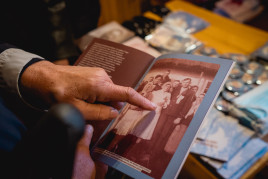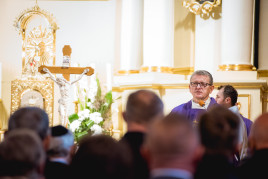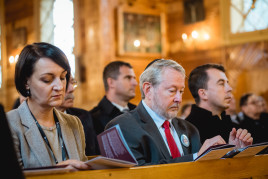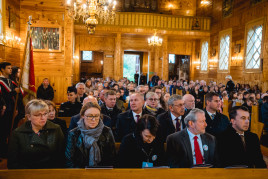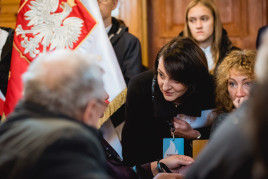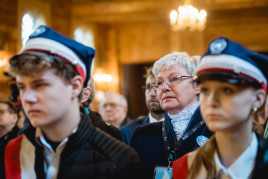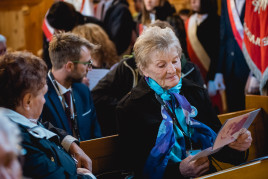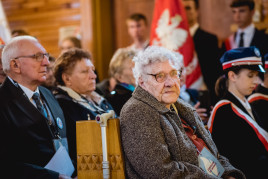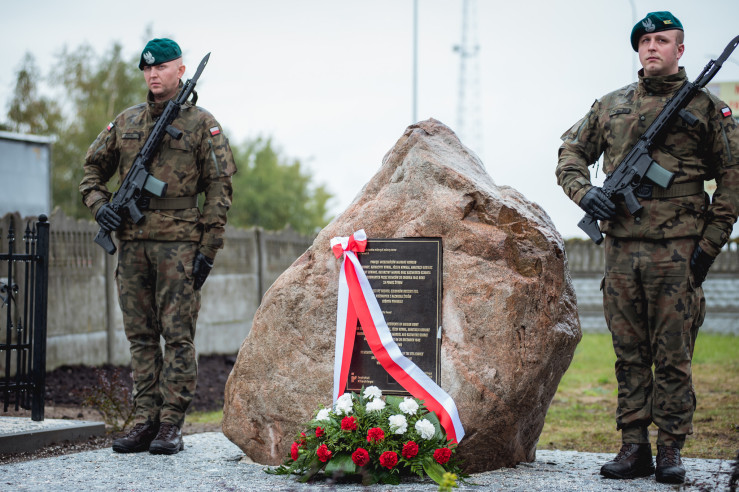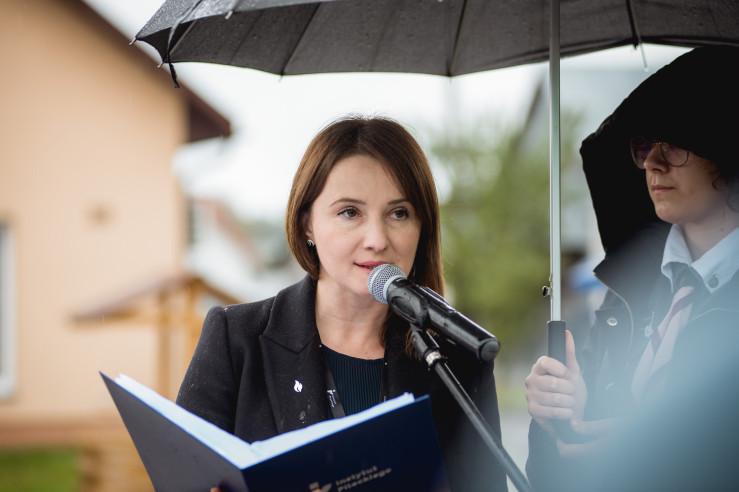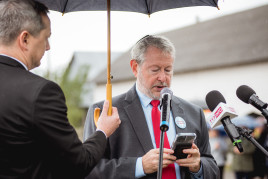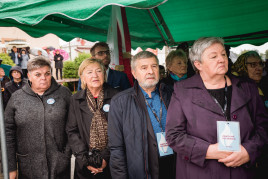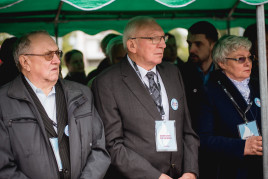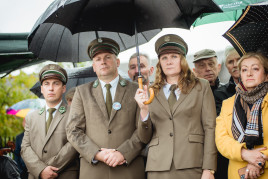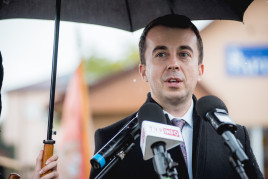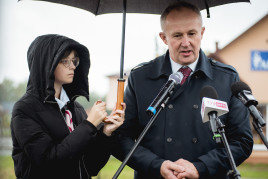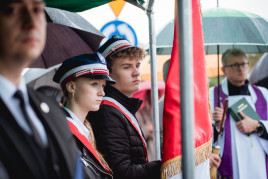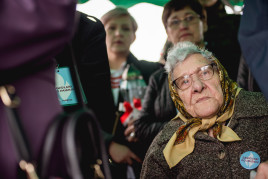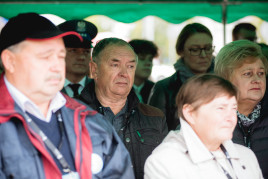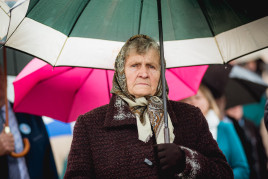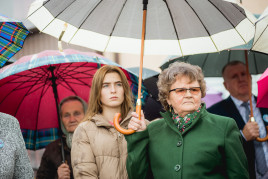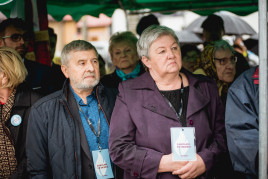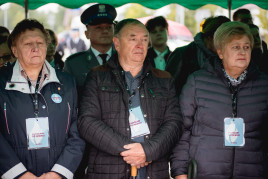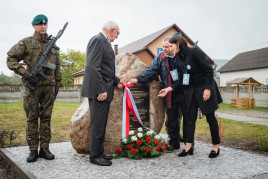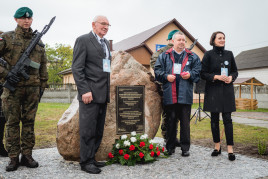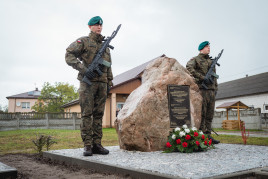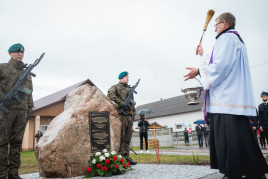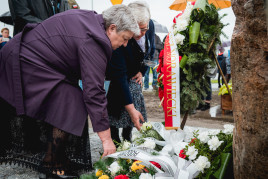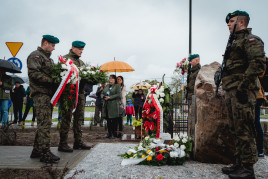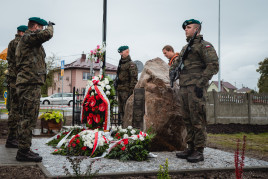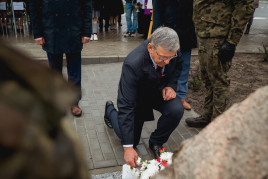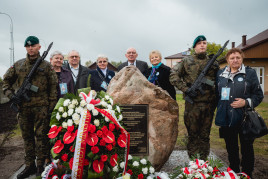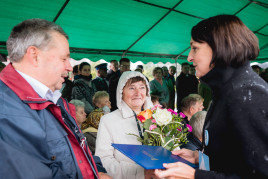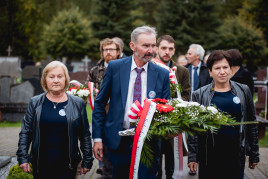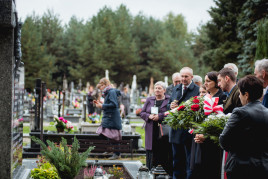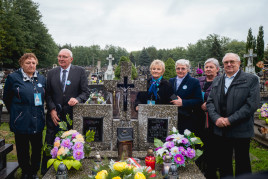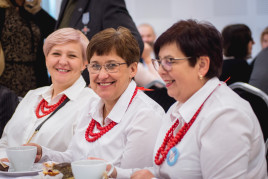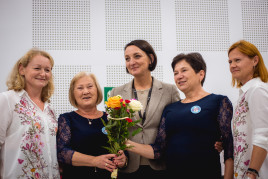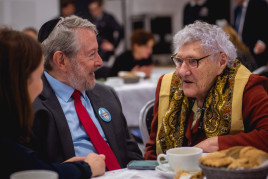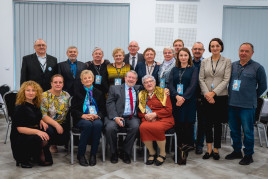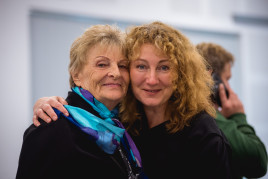Here beats the patriotic heart of Poland. The commemoration of residents of Majdan Nowy who were murdered for helping Jews | CALLED BY NAME - Instytut Pileckiego
Here beats the patriotic heart of Poland. The commemoration of residents of Majdan Nowy who were murdered for helping Jews | CALLED BY NAME
On 29 September 2022 in Majdan Nowy, the Pilecki Institute “called by name” seven residents who were murdered by the Germans on 29 December 1942 in a retaliation action. The Jews whom they were helping were also commemorated.
On the way we met my husband, all in tears, who told me that my mother and brother Józef were shot by the Germans “because of the Jews."
On 29 September 2022 in Majdan Nowy, we “called by name” its residents – Jan Gniduła, Katarzyna Kowal, Józef Kowal, Marianna Łubiarz, Anastazja Łubiarz, Katarzyna Margol and Kazimierz Szabat – who were murdered by the Germans on 29 December 1942. We also commemorated the Jews whom they were helping: Ita Becher and the Feil family. The 29th commemorative stone is another symbolic token of remembrance about those who risked their lives to rescue other people.
The program has received the Honorary National Patronage of the President of the Republic of Poland Andrzej Duda to mark the Centenary of Regaining Independence.
The story of the murder committed against the residents of Majdan Nowy and Stary Lipowiec
In the autumn of 1942, during the liquidation of the ghettos in Biłgoraj, Tarnogród and Józefów, some Jews managed to escape and find shelter in the surrounding forests and abandoned buildings. On 29 December 1942, the German policemen carried out a retaliatory action in the village of Majdan Nowy, murdering both the Jews and their Polish helpers. The Germans seized the property of the murdered and set numerous buildings on fire.
The Jewish victims of the German operation were the Feil family of three, who received support from the Kowals living in Majdan Nowy, as well as Ita Becher, a teenage girl who received assistance not only from the residents of Majdan Nowy, but also from the inhabitants of Stary Lipowiec, which was situated on the other side of the forest. Towards the end of 1942, Ita Becher was arrested, and the German functionaries used bestial torture to force her to name her helpers.
Jan Gniduła, Katarzyna Kowal, Józef Kowal, Marianna Łubiarz, Anastazja Łubiarz, Katarzyna Margol and Kazimierz Szabat were brutally interrogated, and next shot for helping the Jewish fugitives.
As Dr. Grzegorz Kuba, who researched the story of the murder in Majdan Nowy, says: On 29 December 1942, the Germans came to Majdan Nowy to find the residents who were helping the Jewish girl. They murdered seven people, including the underage Józio Kowal, plundered their victims’ property and set fire to two farms.
Testimony of witness Karolina Potocka née Łubiarz, 5 April 1988, Archives of the Institute of National Remembrance, the Lublin District Commission for the Prosecution of Crimes Against the Polish Nation, file ref. no. S.2/00/Zn., pp. 1010–1011:
During the occupation, the Jews were persecuted and murdered. For this reason, those who could started to hide in the woods and ask Poles for help. In 1942, the largest number of Jews came to my parents asking for food. My parents, Antoni and Anastazja, gave them food, but in secret, in the evenings. I did not know the names or surnames of these Jews. They came quite often. On 29 December 1942, the Germans came to the village of Majdan Nowy and shot my mother Anastazja and my grandmother Maria Łubiarz, the mother of my father Antoni, as they were at home at the time. Next they took my parents’ possessions.
Testimony of witness Jan Kowal, 3 July 1987, Archives of the Institute of National Remembrance, the Lublin District Commission for the Prosecution of Crimes Against the Polish Nation, file ref. no. S.2/00/Zn., pp. 955–957:
In the autumn of 1942 (I do not remember the exact day, but it could have been in November), a Jew by the name of Icek came to our farm. I did not know his surname, but I know that he owned the mill and the sawmill in the village of Markowicze, the commune of Księżpol. Icek had come for food earlier as well, and he sometimes said that he needed food for two other people, a Jewish man and woman. He said they were his relatives, but he never gave us their names. At first [they] stayed in an abandoned hut in the village of Gliny, […], and later on also in the woods or in barns. My parents gave Icek a dumpling, and then he went in the direction of the village. I would like to add that our farm was situated about a kilometer away from a larger cluster of buildings in the village of Majdan Nowy.
Testimony of witness Maria Róg née Kowal, 30 June 1988, Archives of the Institute of National Remembrance, file ref. no. BU 392/852, pp. 9–12:
On 29 December 1942, when I was already in Biłgoraj, my father came to visit; he and my husband started whispering to each other. Then my husband got dressed and went out with my father (I was pregnant at the time), telling my mother-in-law that they were going to Majdan Nowy. Since my husband didn’t return home for the night, I went to Majdan Nowy with my husband’s sister, Genowefa Grabias, who lived in Korczów near Biłgoraj. On the way we met my husband, all in tears, who told me that my mother and brother Józef were shot by the Germans “because of the Jews.”
Coming back home, I saw a German shoot hens through his window; the killed hens were collected by the village administrator and placed on the cart on which these Germans had arrived. At the time, the German who was inside told my grandmother Maria Łubiarz to leave the house through the hall. As Maria Łubiarz was crossing the threshold, the Germans shot her in the head from his submachine gun. I saw this, I saw the murder of Maria Łubiarz. After he fired a round at her, she fell lifelessly to the ground.
Excerpt from the testimony of witness Franciszek Łubiarz, 5 April 1988, Archives of the Institute of National Remembrance, the Lublin District Commission for the Prosecution of Crimes Against the Polish Nation, file ref. no. S.2/00/Zn., pp. 1005–1008.
The commemoration
These situations were downright unimaginable. If we look at it from the spiritual point of view, wherever people replaced God’s laws with man’s laws, there the worst things would happen. A man would become an animal to another man, as the residents of Majdan Nowy and the relatives of the families told the employees of the Pilecki Institute.
The commemoration began with a mass at the Church of the Holy Apostles Peter and Paul, which was celebrated by the parish priest, Rev. Adam Sobczak.
After the mass, the guests went to the vicinity of the roundabout in Majdan Nowy, where the commemorative stone was unveiled.
Calling the victims by name, we not only bring them back to their families and the local community, but we also restore them to their rightful place in common historical consciousness. At the same time, thanks to their example, we are reminded about the highest universal values that are the measure of humanity, said Dr. Anna Stróż-Pawłowska, coordinator of the “Called by Name” program.
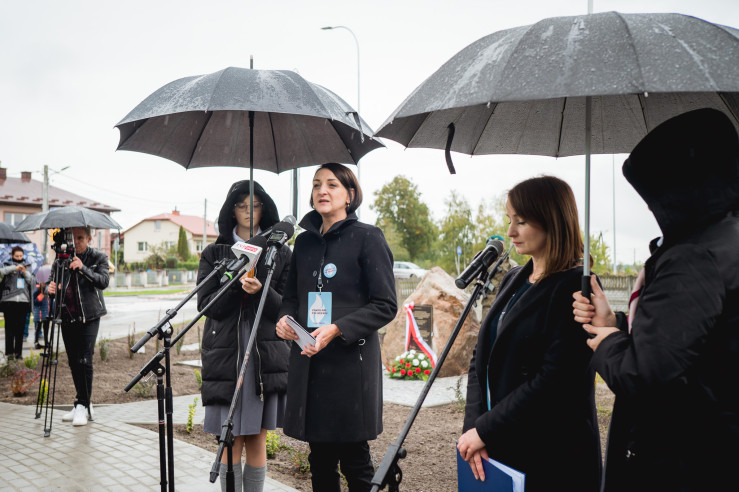
This is a unique area, a unique village. We have recently held a commemoration in Stary Lipowiec, and today we are in Majdan Nowy, a neighboring village. Here the revenge, the repression for helping Jews resulted not only from the residents’ assistance to Jews, but also from their close cooperation with the Home Army. This area has every reason to be proud. Here beat the patriotic heart of Poland. We have to remember about these people, because they are war heroes. They showed us how to fight on a quiet, civilian front – for human life, for truth, for free and independent Poland, said Prof. Magdalena Gawin, Director of the Pilecki Institute and initiator of the “Called by Name” program.
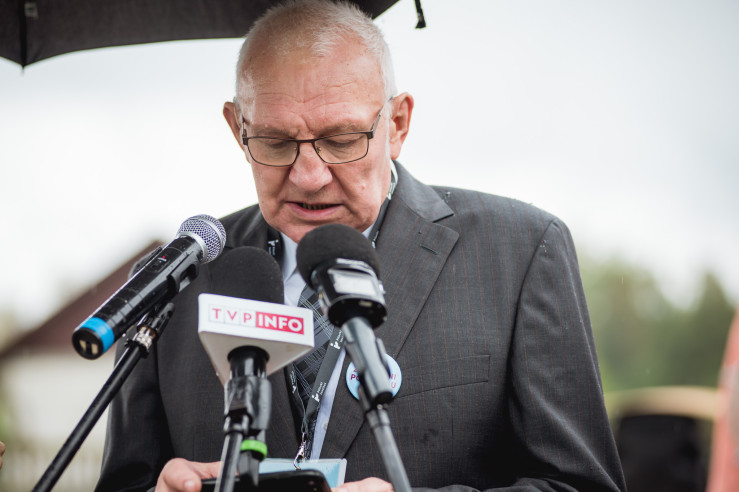
Then came the speeches of representatives of the “Called by Name” families. The first to speak was Mr. Jan Róg, grandson of the murdered Katarzyna Kowal and relative of the murdered Józef Kowal.
When I think back to my conversations with mom, a scene she often described springs to my mind: her farewell to her brother, whom we commemorate today in this symbolic way. Their last meeting, their last contact, the last time they saw each other was when she came to visit a few days before his death and he walked her to the meadow and waited until she reached the village. His memory is still alive with us. Whenever I recall my mom’s stories, I see her emotions and her tears. Today I, as a father and grandfather, repeat these stories to my children and grandchildren.
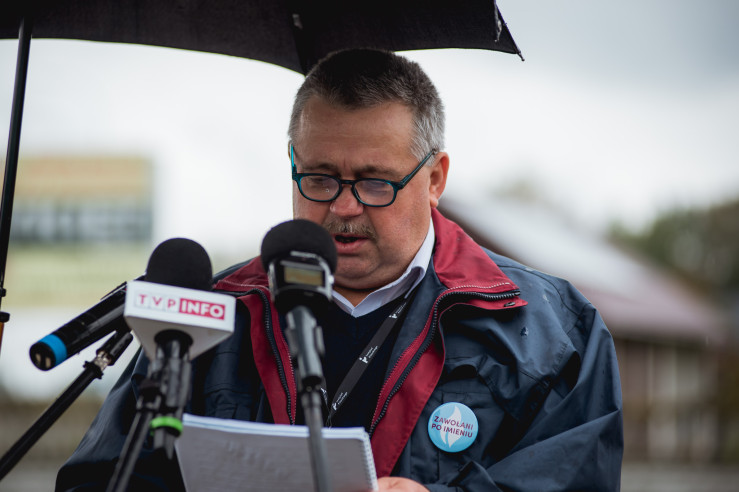
They died because they responded to God’s call to feed the hungry. They didn’t abandon a fellow human in need. They knew the risk to themselves and their families for helping Jews. Despite the threat of death, they decided to help. Their humanity was put to the test. It has to be admitted that they passed this test before God and man with flying colors. I am sure they wanted to live peacefully, just as we live. To work undisturbed, to farm their land, to enjoy their families, to go to church. (…) Everyone has their place on earth, everyone has the right to their own language, culture and faith. This is a God-given right. Nobody is allowed to violate this right. (…) As our Saint Pope said, there is no future without the past. Let us perpetuate our history by passing it on to future generations. Honor and glory to the heroes! Let them rest in peace, said Mr. Czesław Łubiarz, grandson of the murdered Anastazja Łubiarz and great-grandson of the murdered Marianna Łubiarz.
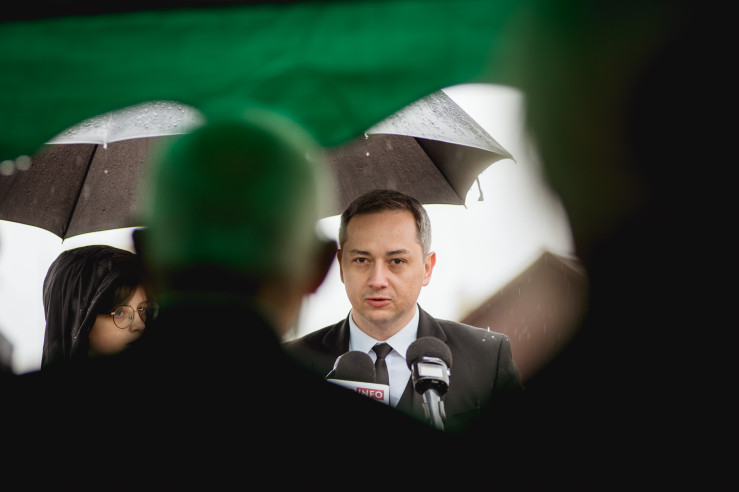
Fulfilling the mission of the Jewish Historical Institute and enjoying our freedom, which is built on the foundation of blood, we have a debt and duty – to remember about and emulate the behavior of the remarkable heroes of those events. They faced the danger with aplomb and risked their own lives to rescue others. Honor to their memory!, said Mr. Dariusz Lipowski, Deputy Director of the Emanuel Ringelblum Jewish Historical Institute.
A prayer on behalf of the Jewish community was said by Jeffrey Cymbler, member of the International Committee of the Ładoś Group and head of the Association of Będzin Jews.
The commemorative plaque was unveiled jointly by Prof. Magdalena Gawin, initiator of the “Called by Name” program, the representative of the Kowal family, Mr. Jan Róg, and the representative of the Łubiarz family, Mr. Czesław Łubiarz.
After the unveiling, wreaths were laid among others on behalf of Prime Minister Mateusz Morawiecki, MP Beata Strzałka and MEP Beata Mazurek.
The commemoration in Majdan Nowy – like all the previous ones – was organized in close cooperation with the local government: the Biłgoraj County and the Księżopol Commune. Soldiers from the 18th Air Defense Regiment in Sitaniec near Zamość stood guard of honor at the commemoration site. In accordance with the Jewish tradition, students from the Zofia Krawiecka School Complex in Majdan Stary laid stones by the commemorative plaque. Next family members and employees of the Pilecki Institute laid flowers on the tombstone of the commemorated.
After the official ceremony, refreshments were served by the local Country Housewives’ Club.
